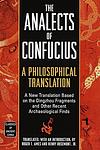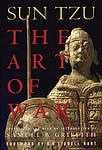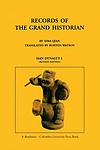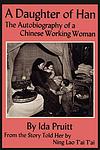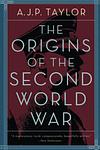The Greatest "Nonfiction, China" Books of All Time
Click to learn how this list is calculated.
This list represents a comprehensive and trusted collection of the greatest books. Developed through a specialized algorithm, it brings together 300 'best of' book lists to form a definitive guide to the world's most acclaimed books. For those interested in how these books are chosen, additional details can be found on the rankings page.
Genres
The "China" category for books encompasses a wide range of literature that explores the history, culture, politics, and society of China. This includes works of fiction and non-fiction, spanning from ancient times to the present day. Books in this category may delve into topics such as Chinese philosophy, art, cuisine, and language, as well as contemporary issues such as economic development, human rights, and environmental concerns. Overall, the "China" category offers readers a diverse and rich collection of books that provide insight into one of the world's oldest and most complex civilizations.
Countries
Date Range
Reading Statistics
Click the button below to see how many of these books you've read!
Download
If you're interested in downloading this list as a CSV file for use in a spreadsheet application, you can easily do so by clicking the button below. Please note that to ensure a manageable file size and faster download, the CSV will include details for only the first 500 books.
Download-
1. Analects by Confucius
The Analects is a collection of sayings and teachings attributed to the Chinese philosopher Confucius and his disciples. The book emphasizes the importance of personal and societal morality, filial piety, and the cultivation of knowledge and virtue. Confucius stresses the importance of leading by example and treating others with respect and kindness. The Analects has had a profound impact on Chinese culture and philosophy, and its teachings continue to be studied and applied today.
-
2. The Art of War by Sun Zi
This ancient Chinese military treatise, written by a renowned general and military strategist, is a comprehensive guide on military strategy and tactics. It covers various aspects of warfare, from planning and preparation to execution and aftermath. The work emphasizes the importance of understanding one's enemy, using deception, and adapting to changing circumstances. It also stresses the importance of terrain, morale, and leadership. Despite its military focus, its principles have been applied to business, politics, and other fields, making it a timeless classic on strategy.
-
3. The Second World War by Winston Churchill
This book provides a comprehensive overview of the Second World War from the perspective of one of its most influential leaders. It covers the entire span of the war, from its origins in the political and economic turmoil of the 1930s, to the major battles and strategic decisions that shaped its course, to its aftermath and impact on the world. The author's unique perspective and firsthand experience, combined with his eloquent and insightful writing, make this a definitive account of one of the most important events in modern history.
-
4. The Woman Warrior: Memoirs of a Girlhood Among Ghosts by Maxine Hong Kingston
This memoir explores the life of a first-generation Chinese-American woman, navigating the complexities of her dual heritage. Through five interconnected stories, the book delves into the author's childhood experiences, her mother's tales of old China, and the struggles of reconciling these two worlds. The memoir is a blend of reality and mythology, illustrating the author's struggle with her identity, the expectations of her traditional Chinese family, and the challenges of growing up in a predominantly white American society.
-
5. Tao Te Ching by Lao Tsu
This ancient text is a fundamental guide to the philosophy of Taoism, offering wisdom on how to live a balanced, virtuous life in harmony with the natural world and the Tao, the source of all existence. The book explores themes such as simplicity, humility, and non-aggression, emphasizing the importance of understanding and aligning oneself with the Tao. It provides guidance on leadership, personal growth, and spiritual enlightenment, advocating for a life of peace, contemplation, and connection with the universe.
-
6. Quotations from Chairman Mao by Mao
This book is a collection of speeches and writings by the former leader of the People's Republic of China. It covers a wide range of topics including communism, revolution, class struggle, and the correct handling of contradictions among the people. The book was published with the intention of promoting the leader's ideology and was widely distributed during the Cultural Revolution. It was considered an essential guide to life and politics in China during this period.
-
7. Wild Swans: Three Daughters of China by Jung Chang
This book is a biographical account of three generations of women in China, spanning the years 1909 to 1991. The narrative follows the lives of the author's grandmother, a warlord's concubine; her mother, a high-ranking official in the Communist Party; and the author herself, who grew up during the Cultural Revolution before moving to the West. The book presents a vivid portrayal of the political and social changes in China during the 20th century, as seen through the eyes of these three women.
-
8. Mencius by Mencius
"Mencius" is a philosophical text that presents the teachings and thoughts of Mencius, a follower of Confucius. The book is a compilation of dialogues, anecdotes, and allegories that illustrate Mencius's views on human nature, morality, and political theory. Central to his philosophy is the belief in the inherent goodness of human nature and the importance of cultivating one's moral character. The book also discusses his ideas on proper governance, advocating for a benevolent and virtuous ruler who prioritizes the welfare of the people.
-
9. Into Thin Air by Jon Krakauer
This gripping non-fiction book recounts the tragic events of the 1996 Mount Everest disaster. The author, a journalist and experienced climber, was part of a commercial expedition to summit Everest. The expedition soon turned disastrous due to a severe storm, leading to the death of several climbers from various teams. The book provides a vivid, personal account of the harrowing ordeal, detailing the physical and psychological challenges faced by climbers at high altitudes, as well as the ethical and commercial aspects of mountaineering expeditions.
-
10. I Ching by China
This ancient Chinese text is a divination system and book of wisdom. It provides guidance for moral and ethical decisions through 64 hexagrams, which are six-line figures made up of broken and unbroken lines. Each hexagram represents a specific situation or state of affairs, and the text provides interpretations and advice for each. The book has been used for centuries as a tool for decision-making, prediction, and gaining deeper understanding of situations and relationships.
-
11. Seven Years in Tibet by Heinrich Harrer
This book is a travel memoir that recounts the author's escape from a British internment camp in India during World War II and his subsequent journey through the Himalayas to Tibet, where he becomes a tutor and friend to the Dalai Lama. The book provides a detailed account of Tibetan culture, customs, and the political turmoil leading up to the Chinese invasion, as seen through the eyes of a foreigner who spent seven years living there.
-
12. Platform Sutra by Huineng
The "Platform Sutra" is an essential text in Zen Buddhism, presenting the teachings and philosophy of a renowned sixth patriarch. The book offers deep insights into the nature of enlightenment and the practice of dhyana (meditation). It emphasizes the concept of 'sudden enlightenment', asserting that it can be achieved by realizing one's own 'Buddha nature'. The text is also known for its promotion of direct, personal experience and the potential for enlightenment in all beings, irrespective of their social or educational status.
-
13. Travels With Myself And Another by Martha Gellhorn
In this vivid memoir, a renowned journalist recounts her adventures across the globe during the mid-20th century, sharing tales of her journeys alongside a mysterious companion referred to as "another." With a sharp wit and a keen eye for detail, she navigates through various landscapes, from the treacherous terrains of China during the Sino-Japanese War to the unforgiving deserts of Africa. Her stories are filled with humor, humanity, and a relentless quest for truth, offering a window into the tumultuous world events of her time as well as a deeply personal narrative of a woman who lived fiercely and fearlessly, embracing the world with an insatiable curiosity.
-
14. Travels by Marco Polo
This book is a detailed account of a Venetian merchant's extensive travels throughout Asia during the 13th century. The narrative provides a comprehensive exploration of the diverse cultures, customs, landscapes, wildlife, and wealth of the Eastern world, including the Mongol Empire and China, where the author spent time in the court of Kublai Khan. His descriptions of the grandeur and sophistication of these civilizations challenged European assumptions about the East, and his tales of exotic wonders and adventures continue to captivate readers today.
-
15. The Gate of Heavenly Peace by Jonathan Spence
"The Gate of Heavenly Peace" is a comprehensive historical analysis of China from the 1890s through the 1980s, focusing on the intellectual and political movements that shaped the country. The book explores the complex interplay between tradition and modernity, and the often tumultuous relationship between the Chinese people and their leaders. It delves into the lives and thoughts of key figures in Chinese history, providing a nuanced understanding of the forces that have shaped China's trajectory.
-
16. The Death of Woman Wang MMP by Jonathan Spence
"The Death of Woman Wang MMP" is a historical narrative that vividly portrays 17th-century rural China, specifically the T'an-ch'eng county in Shantung province. The book focuses on the lives of ordinary people, their struggles, and the harsh realities they face, using the tragic story of a woman named Wang as the central narrative. It also provides a detailed account of the local judicial system and the role of the local historian, all of which are interwoven to create a comprehensive picture of the society and culture of the era.
-
17. Records of the Grand Historian by Sima Qian
"Records of the Grand Historian" is an ancient Chinese text that provides a comprehensive history of China, from the earliest times up to the author's own period. The book is divided into five parts: the Basic Annals, the Chronological Tables, the Treatises, the Hereditary Houses, and the Biographies. It covers the lives of significant figures, political events, cultural developments, and much more. The author's objective and critical approach to history has had a profound influence on Chinese historiography and continues to be a valuable resource for understanding ancient Chinese history and culture.
-
18. In Xanadu by William Dalrymple
"In Xanadu" is a travelogue that follows the journey of a young historian and writer as he retraces Marco Polo's route from Jerusalem to the fabled city of Xanadu in Mongolia. Along the way, the author weaves together a rich tapestry of history and adventure, engaging with diverse cultures and landscapes. His travels take him through the Middle East, South Asia, and into the heart of China, offering insights into the complex interplay between past and present, and the enduring allure of one of history's most legendary journeys. The narrative is as much a personal coming-of-age story as it is a homage to the spirit of exploration and discovery.
-
19. A Comparative Study Of Total Power by Karl Wittfogel
The book in question is a scholarly examination of the concept of 'hydraulic civilization,' a term used to describe societies that manage large-scale water projects such as irrigation and flood control. The author argues that the bureaucratic structures necessary to control water resources in arid regions historically led to the centralization of power and the development of autocratic or despotic forms of government. Through comparative analysis, the work explores how the management of water resources influenced social, economic, and political structures, and how this 'total power' shaped the civilizations in question, with a particular focus on Asia. The study delves into the relationship between natural environments, technological capabilities, and the evolution of political systems.
-
20. Science and Civilisation in China by Joseph Needham
"Science and Civilisation in China" is a comprehensive and authoritative series that explores the history of Chinese science, technology, and medicine. The series delves into the significant contributions China has made in various scientific fields, including astronomy, mathematics, physics, chemistry, biology, and medical science, among others. The author also examines the cultural, philosophical, and social contexts in which these scientific advancements took place, providing a holistic view of China's scientific history and its impact on the world.
-
21. A Daughter Of Han: The Autobiography Of A Chinese Working Woman by Ning Lao Tai-Tai, told to Ida Pruitt
This book provides a personal account of a woman's life in late 19th and early 20th century China, as she navigates the complexities of poverty, tradition, and societal upheaval. Through her eyes, readers experience the struggles of the lower classes, particularly for women, in a rapidly changing society. Her story is one of resilience and determination, as she confronts challenges such as opium addiction in her family, the death of her children, and the need to work as a servant and street peddler. Her narrative offers a vivid portrayal of the customs, family life, and social hierarchies of her time, providing a valuable historical perspective on the life of an ordinary woman in China.
-
22. Second World War by John Keegan
"Second World War" is a comprehensive account of the global conflict that took place from 1939 to 1945. The book offers a detailed examination of the political, military, and social aspects of the war, from the rise of Hitler and the attack on Pearl Harbor, to the Holocaust and the dropping of the atomic bomb. The author provides an in-depth analysis of the strategies and tactics used by the major powers, and presents a vivid picture of the human cost of the war. The book also includes a variety of maps and photographs to help illustrate the events and locations discussed.
-
23. News from Tartary by Peter Fleming
"News from Tartary" is a riveting account of a seven-month journey across 3,500 miles of the desolate and remote areas of China, from Peking to Kashmir. The author and his companion, disguised as locals, face numerous challenges including harsh weather, dangerous landscapes, and political instability. The narrative provides a fascinating glimpse into the cultures, histories, and geopolitics of the regions they traverse, capturing the essence of an Asia that has since undergone significant transformation.
-
24. The Collected Songs of Cold Mountain by Han Shan
"The Collected Songs of Cold Mountain" is a compilation of poems by a legendary Chinese poet. The book is a collection of over 300 poems filled with wit, wisdom, and spiritual insight. The poet, a recluse who lived in the mountains, expresses his views on life, nature, and the impermanence of human existence through his deeply philosophical and often humorous verses. He is considered a significant figure in Chinese literature and his works have greatly influenced Zen Buddhism.
-
25. My Journey to Lhasa by Alexandra David-Neel
This book is a fascinating travel memoir documenting the author's daring and perilous journey to Lhasa, the capital of Tibet, in 1923. Disguised as a beggar and accompanied by a young Tibetan monk, she traversed harsh terrains, braved extreme weather conditions, and evaded authorities who forbade foreigners from entering the city. Throughout her journey, she encountered various aspects of Tibetan culture, religion, and way of life, offering an insightful and vivid portrayal of a land and people largely unknown to the outside world at that time.
Reading Statistics
Click the button below to see how many of these books you've read!
Download
If you're interested in downloading this list as a CSV file for use in a spreadsheet application, you can easily do so by clicking the button below. Please note that to ensure a manageable file size and faster download, the CSV will include details for only the first 500 books.
Download